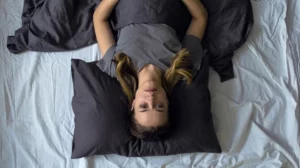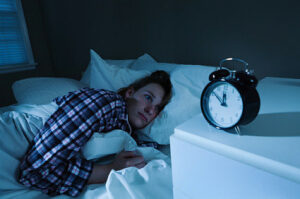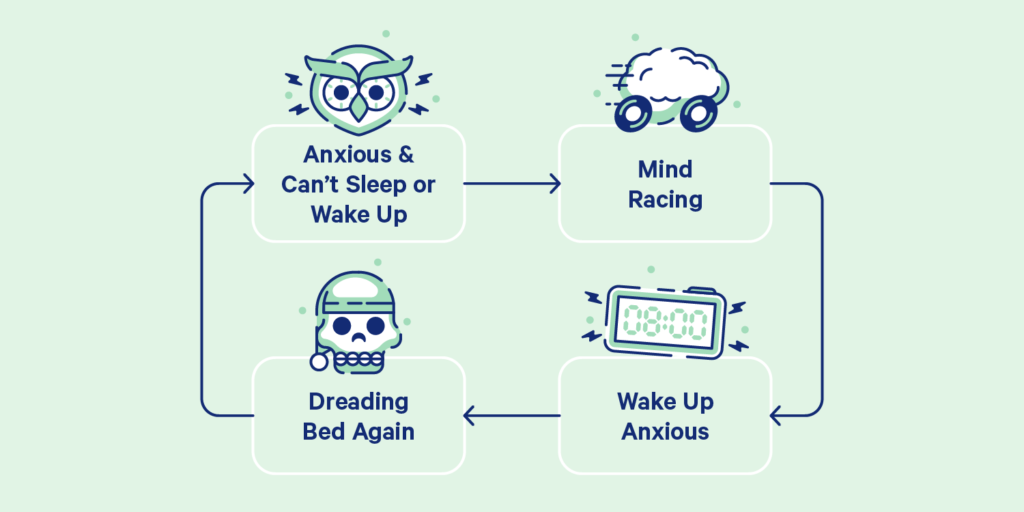Do you find yourself lying in bed, unable to sleep because of the racing thoughts in your head? Or maybe you feel like you’re constantly on edge, worrying about things that could happen tomorrow or the next day? If so, then you may be experiencing night-time anxiety. This article will discuss night-time anxiety, its causes, and how to overcome it!
Contents
What Is Night-Time Anxiety?
 Night-time anxiety is a form of anxiety that is characterized by increased worry and stress during the evening or nighttime hours. Many people with night-time anxiety report feeling more anxious and stressed when they are trying to go to sleep or when they wake up in the middle of the night.
Night-time anxiety is a form of anxiety that is characterized by increased worry and stress during the evening or nighttime hours. Many people with night-time anxiety report feeling more anxious and stressed when they are trying to go to sleep or when they wake up in the middle of the night.
This condition is often accompanied by difficulty falling asleep or staying asleep, as well as restless sleep. Night-time anxiety can also cause physical symptoms in several ways. It is believed that night-time anxiety may be caused by a combination of factors, including genetics, personality, and stress.
According to studies, people who suffer from night-time anxiety are more likely to have a family history of anxiety or mood disorders. People with night-time anxiety may also be more prone to worry and rumination. But there are ways to overcome it. So, do not lose hope and read on to find out what they are.
What Are The Signs And Symptoms?
The signs and symptoms are very similar to those of daytime anxiety, but they may be more intense. Some common are:
- Feeling restless or wound up
- Having trouble sleeping
- Feeling like you can’t turn your mind off
- Feeling jumpy or on edge
- Having a sense of impending doom or danger
- Feeling irritable
- Sweating
- Heart palpitations
- Shortness of breath
- Chest pain or discomfort
The feeling of having a panic attack at night is often more intense because it can be harder to distract yourself from the worry and anxiety. You may also have trouble sleeping after a panic attack, which can make you feel even more exhausted and anxious.
The nighttime anxiety feels like it’s harder to control because your mind is more relaxed and you’re not distracted by work or other activities. This can make the anxiety feel more powerful and overwhelming. Overall, the symptoms can make it hard to function during the day and can impact your quality of life.
Why Do I Only Get Anxiety At Night?
 There are a variety of reasons why people experience anxiety only at night. There are a few theories that might explain why this occurs:
There are a variety of reasons why people experience anxiety only at night. There are a few theories that might explain why this occurs:
One theory is that when we are tired, our bodies and minds are more vulnerable to anxiety. This makes sense because when we are exhausted, we are less able to deal with stress and our bodies are more susceptible to physical symptoms of anxiety (e.g., heart palpitations, shortness of breath, etc
For some, it may be due to worries about the day’s events or upcoming responsibilities. For example, you might be lying in bed at night thinking about a presentation you have to give tomorrow or a difficult conversation you need to have with your boss. This can lead to feeling overwhelmed and anxious.
These common theories are likely to play a role in night-time anxiety for many people. However, there may be other factors at play as well. If you find that you only experience anxiety at night, it might be worth talking to a therapist or counselor who can help you explore what might be triggering your symptoms.
What Triggers Night-Time Anxiety?
There are a number of things that can trigger night-time anxiety. Some common triggers are:
Stressful life events
This is often the most common trigger for night-time anxiety. If you’re going through a tough time at work, or you’re dealing with personal problems, it can be hard to relax at night. Some stressful events can be positive, such as getting married or having a baby, but even these can cause anxiety.
Changes in routine
If you’re used to going to bed at a certain time and suddenly your schedule changes, it can trigger anxiety. This is especially true if you have to get up early for work or school. Because your body is used to a certain routine, changes can be disruptive and cause anxiety.
Caffeine and alcohol
Many people drink coffee or tea to stay awake during the day, but caffeine can also cause anxiety and make it hard to sleep at night. If you’re trying to cut down on caffeine, or you’re sensitive to it, it can cause anxiety and make it hard to sleep. On the other hand, drinking alcohol may help you fall asleep, but it can actually make anxiety worse.
Excessive worry
Worrying about things like money, your health, or world events can cause you to feel anxious. Because when you worry, your body releases stress hormones like adrenaline and cortisol. These hormones increase your heart rate and make you more alert.
Poor sleep habits
 Finally, poor sleep habits lead to night-time anxiety. This is because when you don’t sleep well, you’re more likely to be anxious. Poor sleep habits include things like:
Finally, poor sleep habits lead to night-time anxiety. This is because when you don’t sleep well, you’re more likely to be anxious. Poor sleep habits include things like:
- not going to bed at the same time every night
- using electronic devices before bed
- eating before bed
If you have poor sleep habits, it’s important to change them so that you can get the most restful sleep possible. This will help reduce your night-time anxiety.
So these are some possible triggers for night-time anxiety. If you’re struggling with this issue, it’s important to talk to a doctor or therapist who can help you overcome it. With the right treatment, you can live an anxiety-free life.
How Does It Impact Life?
When left untreated, anxiety can have a significant impact on daily life. Several negative consequences are listed below:
- Anxiety can lead to social isolation and withdrawal.
- Sufferers may avoid activities that trigger anxiety, which can result in a loss of important relationships, opportunities, and experiences.
- Anxiety can cause physical symptoms such as headaches, chest pain, racing heart, sweating, and difficulty breathing. These symptoms can make it hard to concentrate, which can impact work or school performance.
- It can lead to unhealthy coping mechanisms such as alcohol and drug abuse.
- Finally, it creates difficulty sleeping, which leads to fatigue and can worsen anxiety symptoms.
So you should not avoid seeking treatment for anxiety. If you are experiencing any of the symptoms above, please consult with a mental health professional to develop a plan to address your specific needs. More often than not, anxiety is treatable and there is hope for a better tomorrow.
How Do I Stop Night-Time Anxiety?
 It is important to stop your night-time anxiety because, if left unchecked, it can lead to more serious problems such as insomnia. There are a few things you can do to stop your night-time anxiety:
It is important to stop your night-time anxiety because, if left unchecked, it can lead to more serious problems such as insomnia. There are a few things you can do to stop your night-time anxiety:
Talk to your loved ones
This is the first step in overcoming your night-time anxiety. Talk to your partner, family, or friends about what is causing your anxiety, and ask for their support. When you share your feelings, you will feel less alone and more supported, which can help to reduce your anxiety. It also helps to have someone to talk to who understands what you are going through.
Identify your triggers
The next step is to identify your triggers. What are the things that trigger your night-time anxiety? Once you know what your triggers are, you can start to work on avoiding or managing them. Triggers can be different for everyone, so it is difficult to identify them without some trial and error.
Create a bedtime routine
One of the best ways to reduce night-time anxiety is to create a bedtime routine and stick to it. This might include taking a relaxing bath, reading a book, or writing in a journal. Taking some time to wind down before bed can help you feel more relaxed and prepared for sleep. You can also try setting a regular sleep schedule to help regulate your body’s natural sleep rhythm.
Avoid caffeine and alcohol
Both caffeine and alcohol are stimulants and can aggravate anxiety. If you’re struggling with nighttime anxiety, it’s best to avoid them both in the evening. For example, avoid caffeine after lunch and limit alcohol to one glass with dinner.
Get some exercise
Exercise is a great way to reduce stress and anxiety. It releases endorphins, which have mood-boosting effects. A moderate amount of exercise is the key to reducing anxiety; too much exercise can actually increase anxiety levels. There are various types of exercises that you can choose from, such as yoga, Pilates, running, or even brisk walking.
Enough sleep
 Sleep is an essential part of our overall health and well-being, yet it’s something that many of us don’t get enough of. According to studies, adults should be getting around seven to eight hours of sleep per night, but unfortunately, this is often not the case. A lack of sleep can lead to a whole host of problems, both physical and mental.
Sleep is an essential part of our overall health and well-being, yet it’s something that many of us don’t get enough of. According to studies, adults should be getting around seven to eight hours of sleep per night, but unfortunately, this is often not the case. A lack of sleep can lead to a whole host of problems, both physical and mental.
Listen to soothing music
Night-time anxiety causes difficulty sleeping, so listening to soothing music can help you relax and fall asleep. There are many phone apps and online websites that offer free, relaxing music. Some people find that reading or doing a crossword puzzle before bedtime helps to calm their minds and ease anxiety.
Write it down
This is one of the most simple, yet effective things you can do when it comes to anxiety. Get a notebook or piece of paper and write down whatever is causing you anxiety. Once it’s out of your head and on paper, you can start to think more clearly about how to deal with it. Writing makes you more aware of your thoughts and can help you to see them in a different light.
Get up but stay calm
If you’re feeling anxious at night, the first thing you should do is get up and out of bed. remaining in bed will only make you feel more anxious and less capable of dealing with the situation. Get up, stretch, and take some deep breaths. Once you’re feeling a bit more relaxed, try to identify the source of your anxiety.
Seek professional help
 Sometimes, in severe cases, the best thing you can do is seek professional help. A therapist will be able to help you understand and manage your anxiety in a more holistic way. If you’re struggling with night-time anxiety, don’t hesitate to reach out for help. A few therapies can be particularly helpful in treating anxiety, including:
Sometimes, in severe cases, the best thing you can do is seek professional help. A therapist will be able to help you understand and manage your anxiety in a more holistic way. If you’re struggling with night-time anxiety, don’t hesitate to reach out for help. A few therapies can be particularly helpful in treating anxiety, including:
- Cognitive behavioral therapy
- Exposure therapy
- Acceptance and Commitment Therapy
So, these are some ways in which you can manage your night-time anxiety. If you’re struggling with this issue, don’t hesitate to reach out for help. A therapist will be able to create a treatment plan that is tailored specifically for you and your needs. With the right help, you can overcome night-time anxiety and get back to enjoying your life.
Conclusion
In conclusion, night-time anxiety is a very real and serious problem that can have a profound effect on your life. It is important to seek professional help if you think you may be suffering from this condition. There are many effective treatments available that can help you manage your anxiety and get back to enjoying your life.
However, there are also some simple things you can do to help ease your night-time anxiety. Try to relax before bed by reading or taking a bath.
And if you want to know more about this condition. Please get in touch with our expert therapists at Therapy Mantra. They will be more than happy to assist you on your journey to recovery. Contact us today to learn more about our services. You can also book an online therapy session or download our free Android or iOS app.


